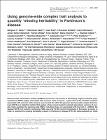| dc.contributor.author | CORVIN, AIDEN PETER | en |
| dc.date.accessioned | 2013-08-07T15:50:42Z | |
| dc.date.available | 2013-08-07T15:50:42Z | |
| dc.date.issued | 2012 | en |
| dc.date.submitted | 2012 | en |
| dc.identifier.citation | Keller MF, Saad M, Bras J, Bettella F, Nicolaou N, Simon-Sanchez J, Mittag F, Buchel F, Sharma M, Gibbs JR, Schulte C, Moskvina V, Durr A, Holmans P, Kilarski LL, Guerreiro R, Hernandez DG, Brice A, Ylikotila P, Stefansson H, Majamaa K, Morris HR, Williams N, Gasser T, Heutink P, Wood NW, Hardy J, Martinez M, Singleton AB, Nalls MA, Using genome-wide complex trait analysis to quantify 'missing heritability' in Parkinson's disease., Human molecular genetics, 21, 22, 2012, 4996-5009 | en |
| dc.identifier.other | Y | en |
| dc.identifier.uri | http://hdl.handle.net/2262/66917 | |
| dc.description | PUBLISHED | en |
| dc.description.abstract | Genome-wide association studies (GWASs) have been successful at identifying single-nucleotide polymorphisms (SNPs) highly associated with common traits; however, a great deal of the heritable variation associated with common traits remains unaccounted for within the genome. Genome-wide complex trait analysis (GCTA) is a statistical method that applies a linear mixed model to estimate phenotypic variance of complex traits explained by genome-wide SNPs, including those not associated with the trait in a GWAS. We applied GCTA to 8 cohorts containing 7096 case and 19 455 control individuals of European ancestry in order to examine the missing heritability present in Parkinson's disease (PD). We meta-analyzed our initial results to produce robust heritability estimates for PD types across cohorts. Our results identify 27% (95% CI 17-38, P = 8.08E - 08) phenotypic variance associated with all types of PD, 15% (95% CI -0.2 to 33, P = 0.09) phenotypic variance associated with early-onset PD and 31% (95% CI 17-44, P = 1.34E - 05) phenotypic variance associated with late-onset PD. This is a substantial increase from the genetic variance identified by top GWAS hits alone (between 3 and 5%) and indicates there are substantially more risk loci to be identified. Our results suggest that although GWASs are a useful tool in identifying the most common variants associated with complex disease, a great deal of common variants of small effect remain to be discovered. | en |
| dc.description.sponsorship | This work was supported by the Intramural Research Programs of the National Institute on Aging, National Institute of Neurological Disorders and Stroke, NIEHS and NHGRI of the National Institutes of Health, Department of Health and Human Services (project numbers Z01-AG000949-02 and Z01-ES101986), human subjects protocol 2003-077. This work was also supported by the US Department of Defense (award number W81XWH-09-2-0128); National Institutes of Health (grants NS057105 and RR024992); American Parkinson Disease Association (APDA); Barnes Jewish Hospital Foundation; Greater St Louis Chapter of the APDA; Hersenstichting Nederland; Neuroscience Campus Amsterdam; and the section of medical genomics, the Prinses Beatrix Fonds. The KORA (Cooperative Research in the Region of Augsburg) research platform was started and financed by the Forschungszentrum fur Umwelt und Gesundheit, which is funded by the German Federal Ministry of Education, Science, Research, and Technology and by the State of Bavaria. This study was also funded by the German National Genome Network (NGFNplus number 01GS08134, German Ministry for Education and Research); by the German Federal Ministry of Education and Research (NGFN 01GR0468, PopGen); and 01EW0908 in the frame of ERA-NET NEURON and Helmholtz Alliance Mental Health in an Ageing Society (HA-215), which was funded by the Initiative and Networking Fund of the Helmholtz Association. The French GWAS work was supported by the French National Agency of Research (ANR-08-MNP-012). This study was also funded by the Michael J. Fox Foundation (MS), and sponsored by the Landspitali University Hospital Research Fund (grant to S.Sv.); Icelandic Research Council (grant to S.Sv.); and European Community Framework Programme 7, People Programme and IAPP on novel genetic and phenotypic markers of Parkinson's disease and Essential Tremor (MarkMD), contract number PIAP-GA-2008-230596 MarkMD (to H.P. and J.Hu.). Genotyping of UK replication cases on ImmunoChip was part of the WTCCC2 project, which was funded by the Wellcome Trust (083948/Z/07/Z). This study was supported by the Medical Research Council and Wellcome Trust disease centre (grant WT089698/Z/09/Z to N.W.W., J.Ha. and A.Sc.). This study was also supported by Parkinson's UK (grants 8047 and J-0804) and the Medical Research Council (G0700943). DNA extraction work that was done in the UK was undertaken at University College London Hospitals, University College London, which received a proportion of funding from the Department of Health's National Institute for Health Research Biomedical Research Centres funding. This study was supported in part by the Wellcome Trust/Medical Research Council Joint Call in Neurodegeneration award (WT089698) to the Parkinson's Disease Consortium (UKPDC), whose members are from the UCL Institute of Neurology, University of Sheffield and the Medical Research Council Protein Phosphorylation Unit at the University of Dundee. Mohamad Saad was funded by the France Parkinson Association. | en |
| dc.format.extent | 4996-5009 | en |
| dc.language.iso | en | en |
| dc.relation.ispartofseries | Human molecular genetics | en |
| dc.relation.ispartofseries | 21 | en |
| dc.relation.ispartofseries | 22 | en |
| dc.rights | Y | en |
| dc.subject | Genome-wide association studies | en |
| dc.subject.lcsh | Genome-wide association studies | en |
| dc.title | Using genome-wide complex trait analysis to quantify 'missing heritability' in Parkinson's disease. | en |
| dc.type | Journal Article | en |
| dc.type.supercollection | scholarly_publications | en |
| dc.type.supercollection | refereed_publications | en |
| dc.identifier.peoplefinderurl | http://people.tcd.ie/acorvin | en |
| dc.identifier.rssinternalid | 83808 | en |




